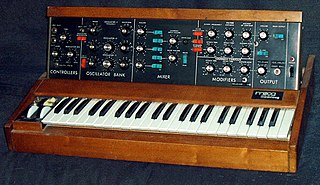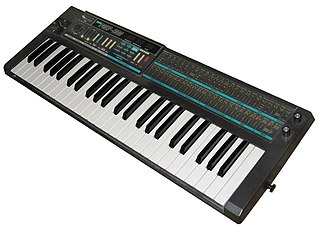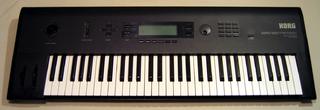
An analog synthesizer is a synthesizer that uses analog circuits and analog signals to generate sound electronically.

Novation Digital Music Systems Ltd. is a British musical equipment manufacturer, founded in 1992 by Ian Jannaway and Mark Thompson as Novation Electronic Music Systems. Today the company specializes in MIDI controllers with and without keyboards, both analog and virtual analog performance synthesizers, grid-based performance controllers, and audio interfaces. At present, Novation products are primarily manufactured in China.
Keytar is a keyboard instrument similar to a synthesizer or MIDI controller that is supported by a strap around the neck and shoulders, similar to the way a guitar is held.

Ensoniq ESQ-1 is a 61-key, velocity sensitive, eight-note polyphonic and multitimbral synthesizer released by Ensoniq in 1985. It was marketed as a "digital wave synthesizer" but was an early Music Workstation. Although its voice generation is typically subtractive in much the same fashion as most analog synthesizers that preceded it, its oscillators are neither voltage nor "digitally controlled", but true digital oscillators, provided by a custom Ensoniq wavetable chip. The signal path includes analog resonant low-pass filters and an analog amplifier.

The Korg Poly-800 is an 8-voice analog synthesizer released by Korg in 1983. Its initial list price of $795 made it the first fully programmable polyphonic synthesizer that sold for less than $1,000. It was designed for portability, featuring battery power and a lightweight design that allowed the user to play with it strapped around their neck. It utilized digitally controlled oscillators (DCOs), and was a paraphonic synth with a single filter shared between its eight voices.
The Yamaha AN1x is a DSP-based analog modeling synthesizer, produced by Yamaha Corporation from 1997 to 1998, and was marketed as an "analog physical modelling control synthesizer".

The Jupiter-8, or JP-8, is an eight-voice polyphonic analog subtractive synthesizer introduced by Roland Corporation in early 1981.

The ARP Odyssey is an analog synthesizer introduced by ARP Instruments in 1972.
Alesis is an American company that designs and markets electronic musical instruments, audio processors, mixers, amplifiers, audio interfaces, recording equipment, drum machines, professional audio, and electronic percussion products. Based in Cumberland, Rhode Island, Alesis is an inMusic Brands company.

Waldorf Music is a German synthesizer company. They are best known for the Microwave wavetable synthesizer and Blofeld virtual analogue synthesizer.

The microKORG is a MIDI-capable digital synthesizer/vocoder from Korg featuring DSP-based analog modelling. The synthesizer is built in such a way that it is essentially a Korg MS-2000 with a programmable step arpeggiator, a less advanced vocoder, lack of motion sequencing, lack of an XLR microphone input, and in a smaller case with fewer real-time control knobs.

The Korg Wavestation is a vector synthesis synthesizer first produced in the early 1990s and later re-released as a software synthesizer in 2004. Its primary innovation was Wave Sequencing, a method of multi-timbral sound generation in which different PCM waveform data are played successively, resulting in continuously evolving sounds. The Wavestation's "Advanced Vector Synthesis" sound architecture resembled early vector synths such as the Sequential Circuits Prophet VS.

The Alesis Ion is an analog modeling synthesizer. It was announced during the NAMM Summer Session in 2002. Unlike the Alesis Andromeda, Alesis's analog synthesizer, its sounds are synthesized using DSP chips to mimic the sound of analog audio circuitry and components.

The Evolver is an analog-digital hybrid synthesizer designed by Dave Smith and manufactured by Dave Smith Instruments. It was first released as a desktop version in 2002, then later a 37-key keyboard bearing the same synth engine as the Evolver desktop was also released. A polyphonic version of the Evolver, dubbed the Poly Evolver, was released in 2004 as a rackmount version, then a 61-key keyboard version of the Poly Evolver was released in 2005. The Evolvers were replaced by new high end models, the Prophet 12 and the Pro 2.
Casio's SDSynthesizers were a late-1980s line of analog synthesizers featuring a resonant filter. SD synthesis was traditional DCO-analog synthesis, with the main difference being that some of the SD waveforms' harmonic spectrums changed temporally, or dynamically in relation to the amplitude envelope.

The AX80 is a polyphonic analogue keyboard synthesizer manufactured by Akai Professional in 1984. It was Akai's first venture into the professional electronic musical instrument market. The AX80 used digitally controlled oscillators (DCO) and filter circuitry based on the Curtis Electronics CEM 3372 integrated circuit. It was marketed as part of a line of project studio equipment called the Akai Music Studio System, which included the S612 digital sampler the MR16 drum machine, the MS08 sequencer, and the MG1212 multitrack tape recorder.
The Roland MKS-80 Super Jupiter is a rack mount sound module version of the Roland Jupiter-6 and the Roland Jupiter-8 synthesizers. It is an 8-voice polyphonic analog synthesizer that was manufactured by Roland between 1984 and 1987. It is the only one of the MKS series of synthesizers to have analogue voltage-controlled oscillators (VCOs) instead of analogue digitally-controlled oscillators (DCOs). The voice architecture is almost identical to the Jupiter-6 synthesizer. The service manual states that "The module board of MKS-80 features the following in addition to that of JP-6, its brother module. 1) HPF. 2) Low boost circuit in the 2nd VCA. 3) DC supply current boost circuit (IC50)."

The AX60 is a polyphonic analogue keyboard synthesizer manufactured by Akai Professional in the mid-1980s. It was Akai's answer to the popular Roland Juno series synthesizers. The AX60 uses voltage-controlled analogue oscillators and filter circuitry based on the Curtis Electronics CEM 3394 integrated circuit.

The CZ series is a family of low-cost phase distortion synthesizers produced by Casio in the mid-1980s. Eight models of CZ synthesizers were released: the CZ-101, CZ-230S, CZ-1000, CZ-2000S, CZ-2600S, CZ-3000, CZ-5000, and the CZ-1. Additionally, the home-keyboard model CT-6500 used 48 phase distortion presets from the CZ line. The CZ synthesizers' price at the time of their introduction made programmable synthesizers affordable enough to be purchased by garage bands. Yamaha soon introduced their own low-cost digital synthesizers, including the DX-21 (1985) and Yamaha DX100, in light of the CZ series' success.

The Yamaha DX21 is a digital controlled bi-timbral programmable digital FM synthesizer with a four operator synth voice generator which was released in 1985. It uses sine wave-based frequency modulation (FM) synthesis. It has two FM tone generators and a 32-voice random-access memory (RAM), 32 user voices and 128 read-only memory (ROM) factory preset sounds. As a programmable synth, it enables users to create their own unique synthesized tones and sound effects by using the algorithms and oscillators. The instrument weighs 8 kg (17.6 lbs). On its release, it sold for $795.















